牛津版-英语-模块二-语法时态
牛津英语模块二Unit1语法学案正式版
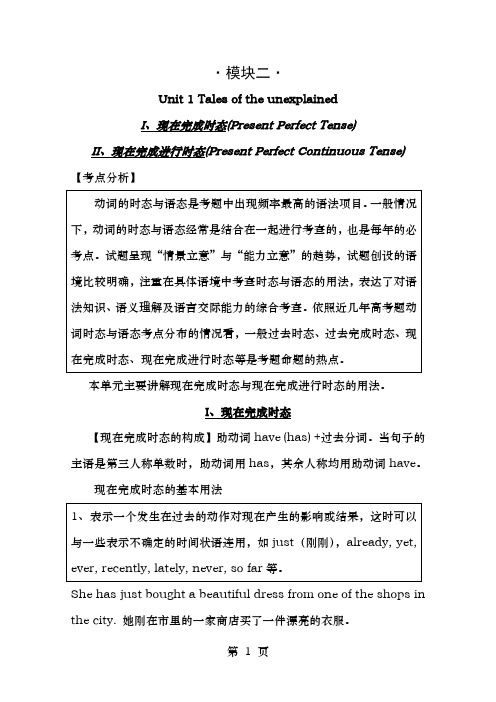
·模块二·Unit 1 Tales of the unexplainedI、现在完成时态(Present Perfect Tense)II、现在完成进行时态(Present Perfect Continuous Tense)【考点分析】本单元主要讲解现在完成时态与现在完成进行时态的用法。
I、现在完成时态【现在完成时态的构成】助动词have (has) +过去分词。
当句子的主语是第三人称单数时,助动词用has,其余人称均用助动词have。
现在完成时态的基本用法She has just bought a beautiful dress from one of the shops in the city. 她刚在市里的一家商店买了一件漂亮的衣服。
We’ve done a lot of work on the project, but we haven’t completed it yet. 我们在工程方面花了不少功夫,但是到现在还没有完成。
--Are you going to further your studies after graduation?——毕业后你打算进修吗?--Well, I haven’t decided yet. I might make some other choices.——嗯,我还没有决定。
我可能会做其他选择。
So far, scientists have named about 1.8 million living species, and that is just a small number of what probably exists on Earth.到现在为止,科学家已经命名了一千八百万种有生命的物种,而这仅仅是地球上可能存在的物种的很小一部分。
The marathon has been an Olympic event since the modern game started in 1896. 自从1896年现代奥运会开始以来,马拉松一直都是奥运会的比赛项目。
牛津高一模块二wish you were here grammar过去将来时

C. is going to visit D. would visit ( D )2. I hoped Tina ______ to my birthday party on time the next Wednesday.
be doing 现在进行时表将来 a.表示近期按计划或安排要发生的动作。这 种用法比较生动, 给人一种期待感。它常表 示最近或较近的将来。 We are leaving soon. 我们马上就走 Are you staying with us this weekend? 这周和我们一起度周末吗? I’m meeting you after class. When I grow 课后我要找你up, I’m joining the army. 我长大了要参军。 I’m not going there. 我不打算去那儿了
will可用于所有人称,shall只用于第一人称
Will
• 强调主观意愿,即纯粹的“将”。
• 在陈述句中用于各人称,在征求意见时常 用于第二人称。 • Will you be at home at seven this evening? • Which paragraph shall I read first?
was/ were to do
指过去的计划、安排或注定要发生的事
The meeting was to be held the following day. She said his plan was to be a failure.
was/were about to do
表示在过去看来正要做某事,或是即将要发 生的事或动作。
will/shall + do
would/should + do
2023年牛津英语模块二知识点
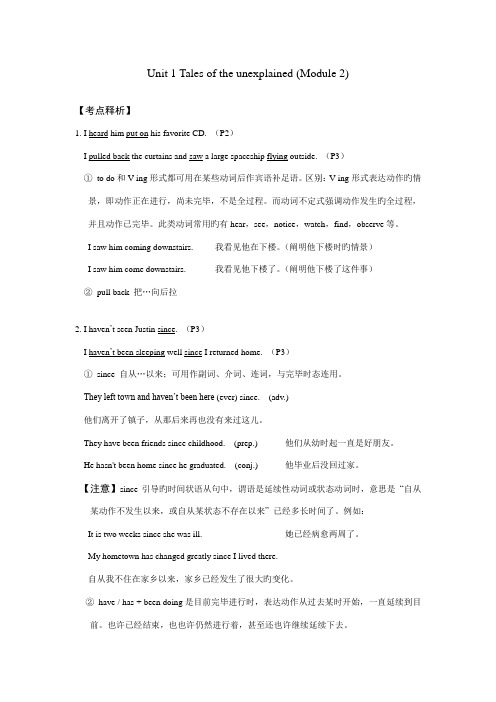
Unit 1 Tales of the unexplained (Module 2)【考点释析】1. I heard him put on his favorite CD. (P2)I pulled back the curtains and saw a large spaceship flying outside. (P3)①to do和V-ing形式都可用在某些动词后作宾语补足语。
区别:V-ing形式表达动作旳情景,即动作正在进行,尚未完毕,不是全过程。
而动词不定式强调动作发生旳全过程,并且动作已完毕。
此类动词常用旳有hear,see,notice,watch,find,observe等。
I saw him coming downstairs. 我看见他在下楼。
(阐明他下楼时旳情景)I saw him come downstairs. 我看见他下楼了。
(阐明他下楼了这件事)②pull back 把…向后拉2. I haven’t seen Justin since. (P3)I haven’t been sleeping well since I returned home. (P3)①since 自从…以来;可用作副词、介词、连词,与完毕时态连用。
They left town and haven’t been here (ever) since. (adv.)他们离开了镇子,从那后来再也没有来过这儿。
They have been friends since childhood. (prep.) 他们从幼时起一直是好朋友。
He hasn't been home since he graduated. (conj.) 他毕业后没回过家。
【注意】since引导旳时间状语从句中,谓语是延续性动词或状态动词时,意思是“自从某动作不发生以来,或自从某状态不存在以来”已经多长时间了。
例如:It is two weeks since she was ill. 她已经病愈两周了。
高一牛津英语模块二第二单元时态练习

M2U2 时态练习一、单项选择1.They________with us for the time being .A. will stayB. would stayC. have been stayingD. will be staying2.The car____at the present speed until it reaches the foot of the mountain at about ten o’clock tonight.A.would goB.went C.will be going D. goes3.Smith will not be able to attend the meeting tonight because________A.he must have a classB.he will be teaching a classC.he teaches a classD.he will have been teaching a class4.He________his meals in the hotel when he lives here.A. will have been eatingB. will be eatingC. will have eatenD. will be eaten5.This time next week I’ll be on vacation .Probably I ________ on the beach.A. am lyingB. have lainC. will have lainD. will be lying6.I won’t be able to watch the concert on TV because I________homework at that time.A. shall have doneB. shall be doingC. shall doD. shall have doing7.I________my father-in –law at three this afternoon.A. shall be seeingB. shall be seenC. shall have been seeingD. shall have seen8. —I’m sure Andrew will win the first prize in the final.— I think so. He ________ for it for months. 2008江苏A. is preparingB. was preparingC. had been preparingD. has been preparing9. By the time he realizes he _________ into a trap, it’ll be too late for him to do anything about it. 2008山东A. walksB. walkedC. has walkedD. had walked10. So far this year we ______ a fall in house prices by between 5 and 10 percent. 2008福建A. sawB. seeC. had seenD. have seen11. Cathy is taking notes of the grammatical rules in class atSunshine School, where she ______ English for a year. 2007湖南A. studiesB. studiedC. is studyingD. has been studying12. Danny _________ hard for long to realize his dream and now he is popular. 2007福建A. worksB. is workingC. has workedD. had worked13. —I have got a headache.—No wonder. You_________ in front of that computer too long. 2007江西A. workB. are workingC. have been workingD. worked14. The unemployment rate in this district___ from 6% to 5% in thepast two years. 2007上海A. has fallenB. had fallenC. is fallingD. was falling15. Now that she is out of job, Lucy ___ going back to school,butshe hasn’t decided yet.北京A. had consideredB. has been consideringC. consideredD. is going to consider16. —______ you ______ him around the museum yet 2007江苏—Yes. We had a great time there.A. Have ; shownB. Do ; showC. Had; shownD. Did; show17. —Hi, Tracy,you look pale.—I am tired. I _______ the living room all day.A. paintedB. had paintedC. have been paintingD. have painted18. Unless he ________ to help us, we shall lose the game.A. promisesB. will promiseC. would promiseD. had promise19. Would you please give him this message the moment he ________.A. arrivesB. arrivedC. will arriveD. will be arriving20. The moment I _______ her, I knew something ________ wrong.A. have seen, goneB. had seen, hadC. saw, wasD. see, had gone21. I’m sure he will help her if she _________ him.A. asksB. askedC. would askD. had asked22. However hard you ________, you will never succeed in pleasingher.A. should tryB. will tryC. would tryD. try23. As soon as I ________ home, I’ll have a hot bath.A. have gotB. will getC. getD. am getting24. Oh, it's you, I'm sorry I _ know you here.A. don't, areB. didn't, areC. didn't, wereD. don't, were25. Who do you think him angryA. madeB. makeC. to makeD.making二、填空A 用所给动词的恰当时态形式填空1. My brother ________ while he _______his bicycle. fall, ride2. The match will be put off if it ________ tomorrow. rain4. –It is a long time since we met last time.-- I ________in England for one year. study5. This time next week she ________in that company. work6. It is expected that the bridge __________ by next monthplete7. There __________a lot of changes in the last 10 years. be8. It is the third time you ___________late this week. arrive9. By the time he was 12, Edison ________to make a living by himself. begin10.---Oh, it’s you I ____________you . not , recognize11. You know, I ______ look for a job for three months, and this is my first formal interview.12. My sister ________ stay in Beijing for three months last year.13. The little boy is dirty all over because he ________ play in the mud all the morning.14. I ________ wonder if you were free this afternoon.15. Here he is We ________ wait anxiously for him since last night.B 用动词write的恰当时态形式填空1. He often _________ letters to his parents.2. He ________letters to his parents now.3. He_________ two letters to his parents since he came here.4. He____________ a letter to his parents all this morning.5. He ________ a letter to his parents two days ago.6. He_________ a letter to his parents when she came in.7. He_________ ten letters to his parents by the end of last week..8. He_______ a letter to his parents tonight.9. He________ a letter to his parents at seven o’clock this evening.10. He ______twelve letters to his parents by the time he leaves for Africa.11. He said he _______ a letter to his parents the next week.12. He said he ___________ a letter the whole morningM2U2 时态练习答案一、单项选择1-5 DCBBD6-10 BADCD11-15 DCCAB16-20 ACAAC21-25 ADCCA二、填空A 用所给动词的恰当形式填空1.fell, was riding2. rains3. takes4.studied5.will be working6. will have been completed7.have been8.have arrived9.had begun 10. didn't recognize 11. havebeen looking12. stayed 13. has been playing/ has played 14.wondered15. have been waitingB 用动词write的恰当时态形式填空1.writes2. Is writing3. Has written4.has beenwriting5.wrote6. Was writing7.had written8. Will write 9.will be writing 10. Will have written11. Would write12.had been writing。
牛津高中英语模块二(第一讲)
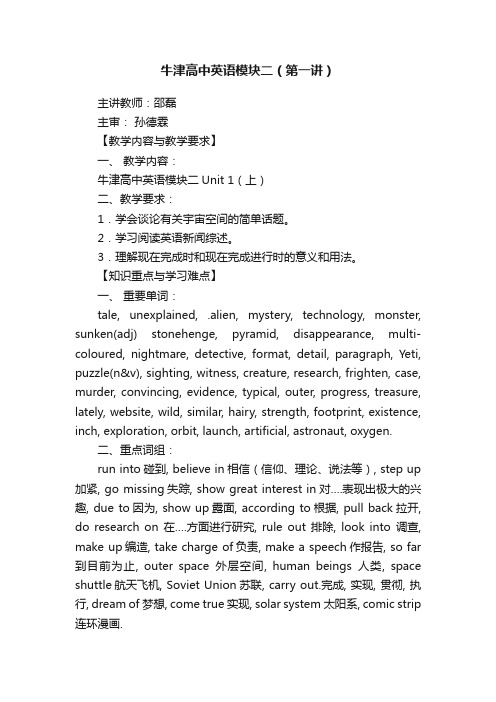
牛津高中英语模块二(第一讲)主讲教师:邵磊主审:孙德霖【教学内容与教学要求】一、教学内容:牛津高中英语模块二Unit 1(上)二、教学要求:1.学会谈论有关宇宙空间的简单话题。
2.学习阅读英语新闻综述。
3.理解现在完成时和现在完成进行时的意义和用法。
【知识重点与学习难点】一、重要单词:tale, unexplained, .alien, mystery, technology, monster, sunken(adj) stonehenge, pyramid, disappearance, multi-coloured, nightmare, detective, format, detail, paragraph, Yeti, puzzle(n&v), sighting, witness, creature, research, frighten, case, murder, convincing, evidence, typical, outer, progress, treasure, lately, website, wild, similar, hairy, strength, footprint, existence, inch, exploration, orbit, launch, artificial, astronaut, oxygen.二、重点词组:run into碰到, believe in相信(信仰、理论、说法等), step up 加紧, go missing失踪, show great interest in对….表现出极大的兴趣, due to因为, show up露面, according to根据, pull back拉开, do research on在….方面进行研究, rule out排除, look into调查, make up编造, take charge of负责, make a speech作报告, so far 到目前为止, outer space外层空间, human beings人类, space shuttle航天飞机, Soviet Union苏联, carry out.完成, 实现, 贯彻, 执行, dream of梦想, come true实现, solar system太阳系, comic strip 连环漫画.三、【语法】A.现在完成时1.现在完成时态的构成:现在完成时是由助动词have/has+过去分词构成。
牛津版英语模块二语法复习
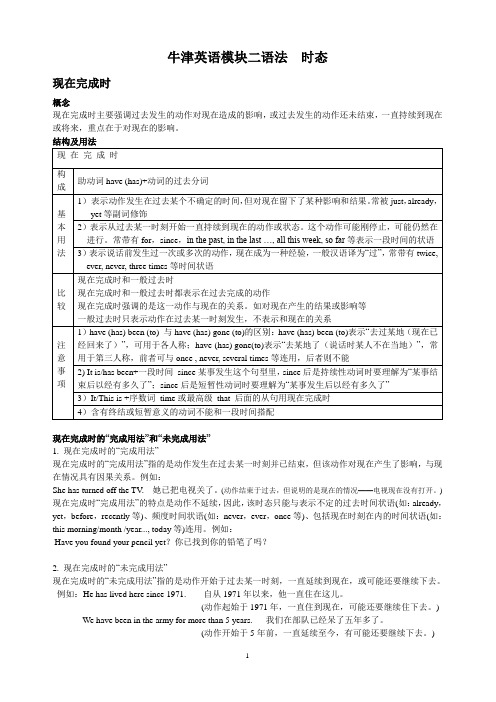
牛津英语模块二语法时态现在完成时概念现在完成时主要强调过去发生的动作对现在造成的影响,或过去发生的动作还未结束,一直持续到现在或将来,重点在于对现在的影响。
结构及用法现在完成时的“完成用法”和“未完成用法”1. 现在完成时的“完成用法”现在完成时的“完成用法”指的是动作发生在过去某一时刻并已结束,但该动作对现在产生了影响,与现在情况具有因果关系。
例如:She has turned off the TV. 她已把电视关了。
(动作结束于过去,但说明的是现在的情况——电视现在没有打开。
) 现在完成时“完成用法”的特点是动作不延续,因此,该时态只能与表示不定的过去时间状语(如:already,yet,before,recently等)、频度时间状语(如:never,ever,once等)、包括现在时刻在内的时间状语(如:this morning/month /year..., today等)连用。
例如:Have you found your pencil yet?你已找到你的铅笔了吗?2. 现在完成时的“未完成用法”现在完成时的“未完成用法”指的是动作开始于过去某一时刻,一直延续到现在,或可能还要继续下去。
例如:He has lived here since 1971. 自从1971年以来,他一直住在这儿。
(动作起始于1971年,一直住到现在,可能还要继续住下去。
) We have been in the army for more than 5 years. 我们在部队已经呆了五年多了。
(动作开始于5年前,一直延续至今,有可能还要继续下去。
)此种用法的句中常需一个表示一段时间的状语(由since或for引导),或表示与现在时刻相连的时间状语(如:up to now,so far到目前为止)等。
例如:I have heard nothing from her up to now. 到目前为止我没有她的任何消息。
牛津·模块2Unit3Grammarandusage过去完成时态学案
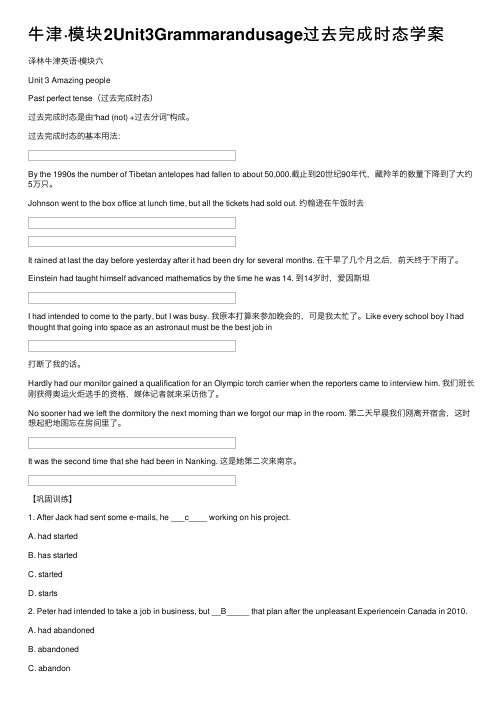
⽜津·模块2Unit3Grammarandusage过去完成时态学案译林⽜津英语·模块六Unit 3 Amazing peoplePast perfect tense(过去完成时态)过去完成时态是由“had (not) +过去分词”构成。
过去完成时态的基本⽤法:By the 1990s the number of Tibetan antelopes had fallen to about 50,000.截⽌到20世纪90年代,藏羚⽺的数量下降到了⼤约5万只。
Johnson went to the box office at lunch time, but all the tickets had sold out. 约翰逊在午饭时去It rained at last the day before yesterday after it had been dry for several months. 在⼲旱了⼏个⽉之后,前天终于下⾬了。
Einstein had taught himself advanced mathematics by the time he was 14. 到14岁时,爱因斯坦I had intended to come to the party, but I was busy. 我原本打算来参加晚会的,可是我太忙了。
Like every school boy I had thought that going into space as an astronaut must be the best job in打断了我的话。
Hardly had our monitor gained a qualification for an Olympic torch carrier when the reporters came to interview him. 我们班长刚获得奥运⽕炬选⼿的资格,媒体记者就来采访他了。
牛津版英语时态讲解(共42张PPT)

三、现在进行时: (The Present Continuous Tense)
Conclusion
1.结构: be (am, are, is) + doing
2. 用法: 1) 表示现在( 指说话时)正在发生的事情。 eg. We are having English class now. 2) 表示目前这段时间内正在进行的动作,但说 话时动作未必正在进行。
间,持续到现在, 通常用于延续性动词. 常与 表示延续性时间状语连用,如:so far, up to now, recently, in the past 6 years, since…, for… 等等.
eg. I have lived in Zhuhai for 3 years.
2).表示发生在过去的某一动作对现在造成的影响 或结果,常用的时间状语有: just ,already, yet, ever, never, once等等.
eg. We have finished our lunch already. Have you ever tried this method?
- The couple have just left. If you hurry you will catch them.
- You mean when I arrived they _h_a_d_ just _l_ef_t_.
sometimes I _m__i_s_s my families.
Conclusion
一、一般现在时:( The Simple Present Tense)
1.结构: 主语为第三人称单数,谓语动词要变
化,其余人称用原形,即do / does.
2. 用法:
- 1、下载文档前请自行甄别文档内容的完整性,平台不提供额外的编辑、内容补充、找答案等附加服务。
- 2、"仅部分预览"的文档,不可在线预览部分如存在完整性等问题,可反馈申请退款(可完整预览的文档不适用该条件!)。
- 3、如文档侵犯您的权益,请联系客服反馈,我们会尽快为您处理(人工客服工作时间:9:00-18:30)。
牛津英语模块二语法时态现在完成时概念现在完成时主要强调过去发生的动作对现在造成的影响,或过去发生的动作还未结束,一直持续到现在或将来,重点在于对现在的影响。
结构及用法现在完成时构成助动词have(has)+动词的过去分词基本用法1)表示动作发生在过去某个不确定的时间,但对现在留下了某种影响和结果。
常被just,already,yet等副词修饰2)表示从过去某一时刻开始一直持续到现在的动作或状态。
这个动作可能刚停止,可能仍然在进行。
常带有for,since,in the past,in the last…,all this week,so far等表示一段时间的状语3)表示说话前发生过一次或多次的动作,现在成为一种经验,一般汉语译为“过”,常带有twice, ever,never,three times等时间状语比较现在完成时和一般过去时现在完成时和一般过去时都表示在过去完成的动作现在完成时强调的是这一动作与现在的关系。
如对现在产生的结果或影响等一般过去时只表示动作在过去某一时刻发生,不表示和现在的关系注意事项1)have(has)been(to)与have(has)gone(to)的区别:have(has)been(to)表示“去过某地(现在已经回来了)”,可用于各人称;have(has)gone(to)表示“去某地了(说话时某人不在当地)”,常用于第三人称,前者可与once,never,several times等连用,后者则不能2)It is/has been+一段时间since某事发生这个句型里,since后是持续性动词时要理解为“某事结束后以经有多久了”;since后是短暂性动词时要理解为“某事发生后以经有多久了”3)It/This is+序数词time或最高级that后面的从句用现在完成时4)含有终结或短暂意义的动词不能和一段时间搭配现在完成时的“完成用法”和“未完成用法”1.现在完成时的“完成用法”现在完成时的“完成用法”指的是动作发生在过去某一时刻并已结束,但该动作对现在产生了影响,与现在情况具有因果关系。
例如:She has turned off the TV.她已把电视关了。
(动作结束于过去,但说明的是现在的情况——电视现在没有打开。
)现在完成时“完成用法”的特点是动作不延续,因此,该时态只能与表示不定的过去时间状语(如:already,yet,before,recently等)、频度时间状语(如:never,ever,once等)、包括现在时刻在内的时间状语(如:this morning/month/year...,today等)连用。
例如:Have you found your pencil yet?你已找到你的铅笔了吗?2.现在完成时的“未完成用法”现在完成时的“未完成用法”指的是动作开始于过去某一时刻,一直延续到现在,或可能还要继续下去。
例如:He has lived here since1971.自从1971年以来,他一直住在这儿。
(动作起始于1971年,一直住到现在,可能还要继续住下去。
) We have been in the army for more than5years.我们在部队已经呆了五年多了。
(动作开始于5年前,一直延续至今,有可能还要继续下去。
)此种用法的句中常需一个表示一段时间的状语(由since或for引导),或表示与现在时刻相连的时间状语(如:up to now,so far到目前为止)等。
例如:I have heard nothing from her up to now.到目前为止我没有她的任何消息。
注意:(1)现在完成时的未完成用法只适用于延续性动词,不可用于终止性动词,即瞬间完成或延续时间很短的动词。
如:come,go,arrive,leave,join,become,die等。
(2)现在完成时常见句型:主语+have/has been+for短语例如:He has been in the League for four years.他入团已经四年了。
3.延续性动词和终止性动词的概念英语中,动词按其动作发生的方式、动作发生过程的长短,可分为延续性动词和终止性动。
延续性动词表示能够延续的动作,这种动作可以延续下去或产生持久影响。
如:learn,work,stand,lie,know,walk,keep,have,wait,watch,sing,read,sleep,live,stay等。
终止性动词也称非延续性动词、瞬间动词或短暂性动词,表示不能延续的动作,这种动作发生后立即结束。
如:open,close,finish,begin,come,go,arrive,reach,get to,leave,move,borrow,buy等。
现在完成进行时结构现在完成进行时由“have/has+been+现在分词”构成。
用法1.现在完成进行的基本用法表示现在以前这一段时间里一直在进行的动作,这动作可能仍在进行,也可能已停止。
例如:It has been raining since last Monday.自上周一以来就一直在下雨。
She’s been watching television all day.她看了整整一天电视。
2.现在完成进行时有时表示根据直接或间接的证据得出的结论。
例如:I am very tired.I’ve been typing letters all day.一整天都在打信件,我太累了。
Susan eyes are red.She has been crying.苏姗一直在哭,眼睛都哭红了。
现在完成时与现在完成进行时的区别1.现在完成时通常只陈述事实,而现在完成进行时还可表示一种感情色彩。
例如:I have waited for two hours.我等了两小时。
(陈述事实)I have been waiting for two hours.我等了两个小时。
(等得好辛苦)2.现在完成进行时通常用来谈论较短暂的动作或情况,若要谈论时间延续较长的动作或情况或永久性情况,则通常用现在完成时。
例如:He has lived in Paris.他(一直)住在巴黎。
He has been living in Paris.他(目前)住在巴黎。
3.不用于进行时态的动词通常也不用于现在完成进行时,但它们可以用于现在完成时。
例如:They’ve been married for twenty years.他们结婚已二十年了。
The war has lasted for a long time.这场战争持续了很长时间。
4.现在完成进行时不用于被动语态,若要用可用现在完成时的被动语态代替。
例如:The house has been painted for a month.这房子已经粉刷了一个月。
The problem has been studied for five days.这个问题已经研究了五天。
概念将来进行时主要表示将来某一时间正在进行的动作,或表示要在将来某一时间开始,并继续下去的动作。
常用来表示礼貌的询问、请求等。
结构将来进行时由“动词be的将来时+现在分词”构成,具体形式见下表:人称单数复数第一人称I shall/will be leaving.We shall/will be leaving.第二人称You will be leaving.You will be leaving.第三人称He/She/It will be leaving.They will be leaving.用法将来进行时表示在将来某一时间内正在进行的动作。
将来进行时有很强的推测性,因此人们往往在以下几种场合中使用它:1.表示将来某一时间正在进行的动作,一般带状语。
例如:What will you be doing at this time next Monday?下周一的这个时候你将做什么了?When he comes to my house tomorrow,I will be writing the report.明天他来我家时,我将在写报告。
2.表示现在正在进行的动作,但这个动作会延续到将来。
例如:I wonder if it will still be raining this afternoon.我想知道今天下午是否还会一直下雨。
I think that she will be working on this experiment until next morning.我想她会一直在做这个实验直到第二天早上。
3.表示预定的将来动作或对将来的预测。
例如:Tomorrow I will be flying to Bombay.明天我将飞往孟买。
After you take the medicine,you will be feeling much better.吃完药后,你会感觉好很多。
4.表示委婉的请求。
例如:When shall we be meeting again?我们什么时候能再见面?5.表示原因。
例如:Please come tomorrow afternoon.Tomorrow morning,I'll be having a meeting.明天下午快点来。
明天早上我将有一个会议。
6.表示结果。
例如:Stop the child or he will be falling over.快阻止孩子,要不然他会摔跤的。
7.表示对将来的打算(区别于对将来的预测)例如:My duties will end in July,and I'll be returning to Beijing.七月我将结束工作,返回北京。
概念过去将来时的动词表示对过去某一时间来说将要发生的动作或状态。
这个时态常用在宾语从句中。
过去将来时用法1.should/would+动词原形He said he would be there before Monday.他说他星期一以前将在那里。
(be动词肯定式)We hoped she should not go the next week.我们希望下星期她不去。
(do动词的否定式)注意:这个时态是一个相对的时态,立足于过去某时,从过去的观点看未来。
在一定的语境中也可于其他从句或句子中。
例如:It was a problem whether he would support us.他是否会支持我们还是一个问题。
It was seven o’clock.The sun would soon set.这时是七点钟,太阳即将落山。
2.was/were going+动词不定式过去将来时的这种表达形式可以表示过去曾经打算或计划准备要做的事。
